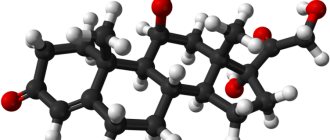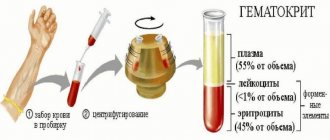Ekaterina Smolnikova
Practicing endocrinologist (10 years of experience). He has extensive experience working in private and public clinics in Russia.
Ask a Question
The hormone leptin, called the “satiety hormone,” was discovered in 1994, and when it was initially studied, the link between blood levels of the hormone and obesity led nutritionists to believe that they had finally found a magic diet pill. But later it turned out that the results of experiments conducted on animals cannot be transferred to humans; Most overweight people were insensitive to the introduction of synthetic leptin into the body. Studies have shown that hormone supplements are useless and sometimes even dangerous. What is the reason for this?
Functions of leptin in the body
The main effects of leptin are:
- regulation of appetite (the hormone is responsible for the feeling of fullness after eating and reducing the feeling of hunger);
- stimulation of the sympathetic nervous system;
- increased blood pressure (blood pressure);
- acceleration of heart rate;
- regulation of thermoregulation processes;
- participation in the regulation of menstruation in women (a sharp decrease in leptin levels in women leads to the disappearance of ovulation and the cessation of menstruation);
- normalization of metabolism;
- preventing the development of obesity;
- decreased insulin synthesis;
- participation in the formation of nerve mediators;
- stimulation of norepinephrine release;
- stimulation of the body's adaptation to fasting (under conditions of fasting, the hormone leptin reduces the synthesis of thyroid hormones and helps reduce the intensity of energy metabolism in cells);
- acceleration of the synthesis of glucocorticoid hormones
- stimulates the synthesis of sex hormones (due to this, normally during puberty the level of leptin in the blood increases), etc.
Treatments for elevated leptin
Unfortunately, there are no medications that can normalize leptin levels. Therefore, it can only be reduced by correcting nutrition and lifestyle, and eliminating provoking factors. The most effective way to keep the hormone concentration normal and control its synthesis by fat cells is to maintain weight within the BMI range.
Nutritional Features
The nutrition program should not be aimed at reducing the level of leptin itself, but at eliminating the body’s resistance to it.
Main principles of eating behavior:
- Eat in small portions. Last meal 3 hours before bedtime.
- Eliminate sugar and salt from your diet.
- Consume no more than 1500-2000 kcal per day. Leave no more than 20% of your daily food intake for dinner.
- Reduce the amount of fat found in fatty meats, baked goods, cream, and sour cream. In small quantities you can consume vegetable oil (coconut oil is especially useful), nuts, and fish.
- The basis of the menu should be cereals and vegetables. They contain fiber, which is necessary for the normal digestion process.
- Minimize the consumption of simple carbohydrates, include more protein compounds.
- Avoid foods with different flavors.
It is not advisable to replace sugar with artificial sweeteners. Although they have zero energy value and no calories, they may increase leptin resistance. It is better to replace sugar with fructose.
Find out the instructions for using Melaxen tablets to replenish hormone deficiency in the body.
Read about the level of insulin in the blood of women on an empty stomach, about the causes and symptoms of deviations in indicators at this address.Follow the link https://fr-dc.ru/vnutrennaja-sekretsija/shhitovidnaya/kolloidnyj-uzel.html and read the information about how and how to treat colloid thyroid nodules.
Physical Culture
It is recommended to engage in anaerobic exercise three times a week. Healthy:
- swim,
- ride a bike,
- to take dance classes,
- run.
It's good if you have home exercise equipment. For the weight loss process to be effective, classes must be continuous and last at least 40 minutes. The room where the training takes place must be well ventilated.
Interval training burns fat well, more intense loads with alternating speeds. Such workouts last about 15-20 minutes.
What are the dangers of high or low leptin levels?
A high level of leptin in the blood sharply increases the risk of developing coronary heart disease, vascular thrombosis of the lower extremities, myocardial infarction, stroke, etc.
This is due to the fact that with an increased level of the hormone leptin, a sharp decrease in the elasticity of the vascular walls occurs and active thrombus formation begins (leptin stimulates blood clotting).
Also, high levels of leptin in the blood lead to the development of cell resistance to the effects of insulin, contributing to the development of insulin-resistant forms of type 2 diabetes.
At the same time, low levels of leptin in the blood lead to disruption of metabolic processes in tissues and are accompanied by the development of obesity. With genetic deficiencies of the hormone leptin, severe obesity is observed, which is practically uncontrollable by diet.
Such forms of obesity are treated by administering exogenous forms of the hormone leptin.
Leptin and the development of type 2 diabetes
Type 2 diabetes (non-insulin dependent) is common in obese people and is characterized by insulin resistance, i.e. decreased sensitivity of liver cells and muscle fibers to insulin. Typically decreased sensitivity to leptin, i.e. leptin resistance further leads to decreased sensitivity to insulin and the development of type 2 diabetes.
Endocrinologists, when patients with insulin resistance come to them, first of all recommend that they normalize their weight, with moderate weight loss, at a rate not exceeding 0.4-0.5 kg per week, which reduces the number of adipocytes in the body, with a decrease in leptin levels, and Decreased insulin resistance allows you to stop prescribing sugar-lowering drugs or reduce their dosage.
Weight normalization is especially effective in the initial stages of non-insulin-dependent diabetes mellitus.
Indications for analysis of leptin levels
The analysis is performed when:
- suspected presence of genetic leptin deficiency;
- insulin-resistant forms of type 2 diabetes mellitus;
- the patient has metabolic disorders;
- body weight deficiency of unknown origin;
- violation of reproductive function, combined with a pathological decrease or increase in body weight;
- blood clotting disorders with a tendency to active thrombus formation;
- high risk of developing cardiovascular diseases;
- menstrual irregularities of unknown etiology;
- pronounced atherosclerotic damage to the vascular bed, etc.
Great news!
I hasten to please you! My “Active Weight Loss Course” is already available to you anywhere in the world where there is Internet. In it, I revealed the main secret of losing weight by any number of kilograms. No diets and no hunger strikes. The lost kilograms will never come back. Download the course, lose weight and enjoy your new sizes in clothing stores!
That's all for today. Thank you for reading my post to the end. Share this article with your friends. Subscribe to my blog. And let's move on!
Normal leptin levels
Normally, leptin levels change with age. It should also be noted that the leptin level in women is higher than in men (this is due to the distribution of adipose tissue).
The hormone level is determined in ng per milliliter.
Normal leptin values by age are presented in the table:
How to increase leptin levels and restore sensitivity to it?
Increasing sensitivity to leptin will help cure hypertension, coronary insufficiency, and manifestations of metabolic syndrome.
You can increase the level of the hormone by normalizing your lifestyle, giving up bad habits and switching to proper nutrition. The following activities are advisable:
- reducing the proportion of animal fats in the diet, avoiding trans fats, margarines, including in the diet a sufficient amount of mono- and polyunsaturated fats of the omega-3 family (olive oil, camelina or flaxseed oil, fatty fish from cold seas);
- limiting the amount of fried and processed meat in the diet;
- refusal of fast carbohydrates (sugar, baked goods), salty snacks (chips, kirieshki);
- eating about 400 g of vegetables per day, half of them raw;
- only complex carbohydrates (whole grain cereals, berries and fruits);
- inclusion of a sufficient amount of fiber in the diet (25-30 g);
- exclusion of carbonated and sweetened drinks; preferred drinks are water, tea or black filtered coffee;
- full sleep, at least 7 hours;
- treatment of chronic diseases;
- excluding extreme diets for weight loss, losing weight only on a balanced diet with a mixed diet with a deficit of over 400 kcal;
- interval nutrition according to the 16/8 or 14/10 scheme is healthier than fractional meals, ideally three meals a day without snacks;
- devote at least 30 minutes a day (preferably 45-60 minutes) to physical activity available to you (walking, jogging, aerobic sports equipment);
- The doctor may prescribe Metformin or Byeta to increase the response to leptin.
The satiety hormone leptin is produced by adipose tissue in the body and regulates appetite, and thereby the amount of adipose tissue, keeping this amount constant at an optimal level. The main reason for the violation of the system of regulation of fat reserves is a decrease in the body's sensitivity to this hormone (leptin resistance), which requires normalization of body weight by maintaining a healthy lifestyle and a balanced diet with a sufficient amount of essential macro- and micronutrients.
Causes of obesity
In addition to high levels of leptin or its genetic deficiency, obesity can develop due to:
- endocrine pathologies (hypothyroidism, Itsenko-Cushing syndrome, etc.);
- genetic disorders accompanied by a predominance of aerobic metabolism in cells and an economy of carbohydrate and lipid compounds;
- prolonged stress (nervous stress is accompanied by an increase in the level of glucocorticoid hormones that stimulate the formation of fatty deposits);
- lack of physical activity;
- chronic sleep deficiency and fatigue;
- unbalanced nutrition, overeating, frequent snacks on the go, abuse of fatty foods, fast foods, foods containing easily digestible carbohydrates, excessive consumption of sweets and starchy foods, etc.
- treatment with steroid drugs;
- brain tumors, skull injuries, empty sella syndrome.
The hormone leptin is increased - what does this mean? Brain error?
In living processes, everything is subject to strict logic. If we have something in excess, then we need to fight it. A stream of hormones poured out, and the “guard” in the form of a barrier of our brain blocked its entrance. There is not enough space in the “reception room” of the Hypothalamus to admit a whole crowd there.
The more fat, the more hormone there is, and the more firmly the gates close against it. There comes a time when the hypothalamus stops perceiving this intrusive leptin! And resistance develops.
Friends!
I, Andrey Eroshkin, will conduct mega interesting webinars for you, sign up and watch! Topics of upcoming webinars:
- How to lose weight without willpower and prevent the weight from coming back?
- How to become healthy again without pills, the natural way?
- Where do kidney stones come from and what can be done to prevent them from appearing again?
- How to stop visiting gynecologists, give birth to a healthy child and not grow old at 40?
SIGN UP FOR THE WEBINAR
It has the opposite effect - it starts to send signals about exhaustion and triggers a feeling of hunger, which grows with weight. Moreover, it slows down metabolic processes, trying to preserve as much fat as possible. And how to fix the situation?
Why is obesity dangerous?
The development of obesity is accompanied by a high risk of:
- cardiovascular pathologies (atherosclerotic vascular lesions, strokes, myocardial infarction, coronary heart disease, angina pectoris, arrhythmias, etc.);
- arterial hypertension;
- osteoporosis (due to increased load on bone tissue);
- osteochondrosis (due to increased load on cartilage tissue);
- cholelithiasis;
- diabetes mellitus;
- ovarian dysfunction in women, etc.
The role and functions of the hormone
Translated from Greek, “leptin” means slender, thin. This hormone belongs to the group of adipokines. It is not produced by endocrine glands, but by adipose tissue, which consists of cytokines that transmit signals to the hypothalamus about the amount of fat deposits, their decrease and increase after eating.
Leptin can also be synthesized by other tissues:
- placenta;
- mammary glands;
- gastric mucosa;
- bone marrow;
- liver.
Mechanism of action of the hormone:
- after eating, fat cells begin to secrete leptin;
- after that it enters the bloodstream;
- enters the hypothalamus with the blood and gives a signal of saturation;
- in response to the action of the hormone, the brain gives a signal to increase energy expenditure and reduce appetite.
What is the hypothalamus responsible for and where is the highest autonomic center in the body? We have the answer!
Read about the causes of high blood glucose in women, as well as the normal levels, at this address.
The hormone also performs the following functions:
- increases the process of thermogenesis;
- acts on the process of dopamine production;
- stimulates the production of estrogen;
- inhibits insulin secretion;
- regulates the menstrual cycle.
If leptin functions normally, it protects the body from the occurrence of eating disorders (anorexia, obesity).
Leptin's ability to reduce insulin can also have negative consequences for the body. The higher the leptin level, the higher the likelihood of developing insulin resistance and type 2 diabetes. An increase in the satiety hormone negatively affects the condition of blood vessels. They become less elastic, which increases the risk of thrombosis.
A Way to Balance Leptin and Ghrelin
The only way to break this vicious circle is to engage in aerobic exercise. This will help gradually restore the sensitivity of the hypothalamus to leptin. In turn, the hunger hormone ghrelin also returns to normal. Studies have shown that even half an hour of aerobic exercise helps to significantly reduce the concentration of ghrelin in the blood. Thus, intense physical exercise helps both to get rid of excess fat and reduce appetite.
To better manage the balance of leptin and ghrelin in the body, researchers make the following recommendations. Firstly, you need to follow a strict daily routine - go to bed around ten in the evening and get up at six in the morning. Secondly, you need to do exercises or other physical exercises every morning. Even mild exercise on an empty stomach has been shown to improve glucose and insulin sensitivity. And this is a good way to prevent diabetes.
Reasons for increased hormone levels
99% of overweight people have elevated leptin. To determine it, you need to take a blood test in the morning on an empty stomach.
For a more accurate clinical picture, additional studies should be performed:
- general and biochemical blood test;
- kidney tests;
- lipid profile;
- blood test for hormones;
- measuring blood sugar.
The hypothalamus may not perceive leptin under the influence of various factors:
- exceeding the permissible norms of fatty acids in the blood;
- chronic inflammation in the body;
- polycystic ovary syndrome;
- excessive amounts of sugars and carbohydrates in the diet;
- lack of physical activity, physical inactivity;
- debilitating emotional turmoil;
- sleep disturbance.
Since most of these factors are observed in obese people, it becomes a closed system: excess weight leads to leptin resistance, which, in turn, contributes to weight gain.
Physiological hyperlaptinemia is observed during menstruation, during pregnancy, during menopause, and is temporary.











